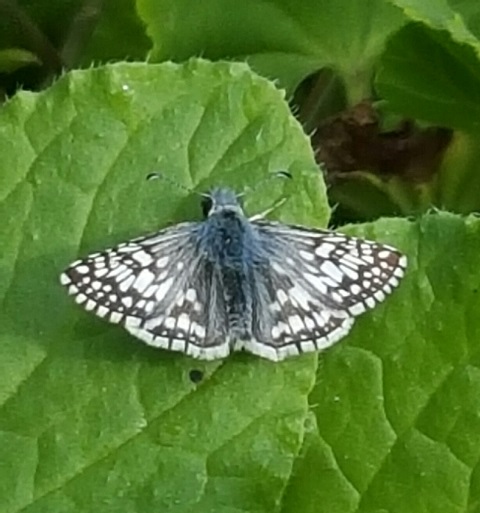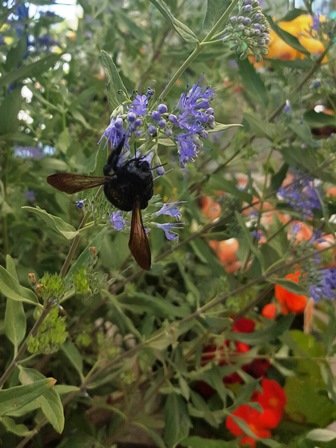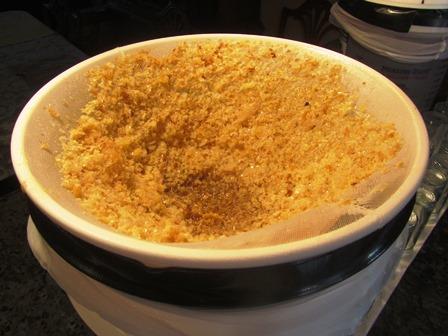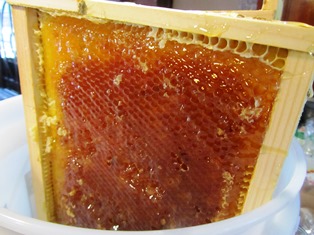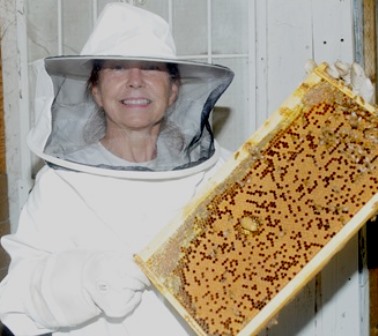Archive for October, 2016
Beauty in the Garden–Butterflies and Other Pollinators
I enjoyed studying botany and zoology in school, but never felt attracted to the study of butterflies, bees, beetles, and bugs with any kind of intensity. I regret that. Not only because some of these pollinators are beautiful, but many are also beneficial to gardens and orchards.
As a beekeeper, it’s my job to notice moths, hive beetles, and other flying and crawling insects. Though some are beautiful and beneficial, others can harm my honeybee hives. That’s why when walking around my garden, I pay attention to all sorts of creatures–whether winged or not.
I do love to see butterflies and Lady Beetles (also known as ladybugs, a beneficial garden insect) amid my flowers, bushes, and trees. Today, I spotted a lovely winged creature with black-and-white patterned wings and a blue body.
It stood out against the green leaves of plants in my bee garden and waited for me to run inside the house to get my cell phone camera.
I wonder if anyone can correctly identify this blue-body, black-and-white winged flier for me. Could this be an Arrowhead Blue butterfly? These, I know, are found in Northern California and the Sierras.
Another pollinator that “posed” for me earlier this year is the longhorn bee. It’s about the size of a bumble bee. Some of these fliers are so lovely, I could see spending hours taking pictures.
But chores and all the other farmette tasks take priority over photography. Still, I hope the pictures are clear enough for someone to identify the species when I can’t.
* * *
NEWLY RELEASED–The Murder of a Queen Bee (Kensington Publishing, NY–Sept. 2016).
Discover recipes, farming tips, and sayings as well as sort out a charming whodunnit. Click on the link under the picture.
See, http://tinyurl.com/h4kou4g
See, http://tinyurl.com/hxy3s8q
This debut novel launched the Henny Penny Farmette series of mysteries and sold out its first press run. It’s now available in mass market paperback and other formats.
First the Harvest, then the Floor
My kitchen floor was littered with bits of wax and bee glue yesterday. It took me over an hour on my knees to scrub and clean it after I had uncapped thirty frames of honey I’d taken from my hives.
In the process of scraping each frame and then unsealing all the capped cells on the front and back of each frame, drops of wax and propolis, or bee glue (created by the bees from bee saliva, wax, and exudate from botanical sources) fell to the floor. I tracked it from the counter, sink, and extractor on the soles of my shoes.
Even before I put my honey buckets under the extractor spigot, I tape fine mesh strainers over the buckets to catch wax and other debris.
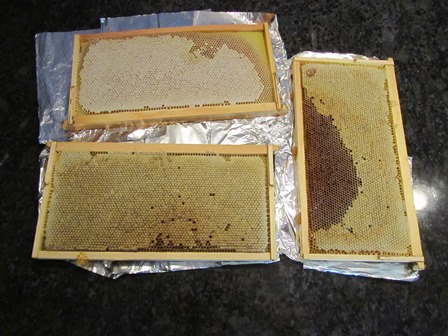
Three frames containing honey, but the sweet stuff is locked inside a honeycomb of cells sealed with wax by the bees
Once all the frames are processed and the buckets are sealed, I put the wax I’ve removed from the frames into a mesh bag to drain the honey (usually a much smaller quantity of honey is recovered from this process).
When the honey has been removed from the mesh bag, I place that wax on a cookie sheet and set it in the garden for the bees to clean. After the bees have cleaned all the wax (by eating any drops of honey left), I save the wax to melt into bars for candles or soap-making.
Back in in the kitchen, the extractor, it must be washed inside and out. Once cleaned and moved to the patio, I must start removing the wax and propolis from the floor. For that, I use an old thin, metal spatula to scrape the tile free of wax.
A soap and water scrub follows. Then I rinse and dry the floor with rags before moving the honey extractor back into the kitchen.
I won’t take honey again until next year. But now the honey must be bottled–that means I must sterilize bottles and prepare labels. Keeping honeybees is really only this labor intensive during and after the honey harvest. But the harvest is well worth all the work.
If you enjoy reading about farmette topics (including gardening, beekeeping, and delicious recipes), check out my cozy mysteries A BEELINE TO MURDER and also THE MURDER OF A QUEEN BEE in the Henny Penny Farmette series (from Kensington Publishing).
* * *
Enjoy reading about farming topics? Check out my cozy mysteries–A BEELINE TO MURDER and also THE MURDER OF A QUEEN BEE (both in the Henny Penny Farmette series from Kensington Publishing).
These novels are chocked full of recipes, farming tips, chicken and beekeeping tips, sayings and, of course, a charming cozy mystery. For more info, click on the links under the pictures.
The books are available through online retailers such as Amazon, Barnes & Noble, Kobo Books, and Walmart as well as from traditional bookstores everywhere.
See, http://tinyurl.com/hxy3s8q
This debut novel launched the Henny Penny Farmette series of mysteries and sold out its first press run. It’s now available in mass market paperback and other formats.
See, http://tinyurl.com/h4kou4g
NEWLY RELEASED! This, the second cozy mystery in the Henny Penny Farmette series, is garnering great reviews from readers and industry publications.
Harvesting Honey–A Labor of Love
Sitting in the middle of my kitchen is a three-story hive box with thirty frames of honey that needs to be extracted, filtered, and poured into jars.
My apiary is small–just two hives. Taking the honey is quite a labor-intensive activity. But it brings its own kind of joy. As pollinator populations decrease, keeping bees is a small thing I can do for all of us . . . for our planet.
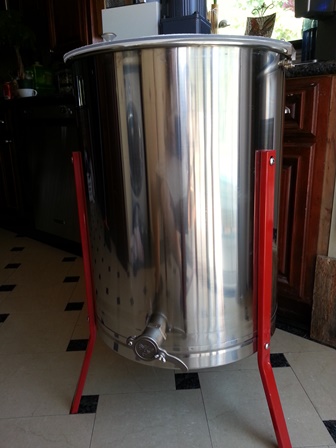
This electric honey extractor holds four frames; honey is spun out through centrifugal force and drains through the spigot
The stainless steel honey extractor, washed and scrubbed, has been pushed over by the oven to make a little space in my already-small kitchen.
Today, I washed the countertops, my stove, and even the sink with hot soapy water and bleach. Then after a thorough wipe-down, I stretched sheets of aluminum foil over the countertop. The extraction process started with four frames.
It’s a simple process. I set the four frames of honey on the foil-covered counter. Using a hot knife, I open the capped cells on both sides of the frames and put them in the honey extractor. Beneath the machine’s spigot, I’ve already positioned a five-gallon bucket with strainer attached. I start the machine on a slow speed and open the spigot.
Each of the five gallon and two-gallon buckets were previously washed and covered with strainers. These are held in place with heavy duty duct tape wrapped around the mouths. Switching out a full bucket for an empty one is easy when the buckets are prepped for use before the extraction starts.

Springtime honey appears golden in the frames whereas autumn honey is often darker (depending on what’s flowering, but often star thistle and eucalyptus, in my area)
I expect a yield of about thirty-five gallons this time. I lost one hive . . . more on that later, but, in all, it looks to be a good honey harvest for our family and friends.
As soon as I extract all the honey, I’ll start bottling it and affixing labels. It’s a process that will take several days to complete.
Tasting, smelling, and seeing all this golden, delicious honey that the bees created warms my heart. When we take care of them, they take care of us. And we always leave plenty of honey in the hives for the bees to eat throughout the winter.
* * *
If you enjoy reading about farmette topics (including gardening, beekeeping, and delicious recipes), check out my Henny Penny Farmette cozy mysteries series from Kensington Publishing.
These novels are chocked full of recipes, farming tips, and sayings as well as a charming cozy mystery.
See, http://tinyurl.com/hxy3s8q
This debut novel launched the Henny Penny Farmette series of mysteries and sold out its first press run. It’s now available in mass market paperback and other formats.
See, http://tinyurl.com/h4kou4g
JUST RELEASED! This, the second cozy mystery in the Henny Penny Farmette series, is garnering great reviews from readers and industry publications.
My books are available through online retailers such as Amazon, Barnes & Noble, Kobo Books, and Walmart as well as from traditional bookstores everywhere.
A Sprained Leg Can Spell the End for a Chicken
Foxes have been routinely prowling my property and have claimed two chickens from my neighbor over the last few weeks. Thank goodness, they weren’t my hens. That said, one of my White Leghorns, a breed that originated in Tuscany but is widely raised here, developed a sprained leg, making her extra vulnerable to predators.
I noticed she was having trouble standing a few days ago. Then yesterday, I found her cowering under the hen house steps because the flock had been attacking her. I immediately removed her and tried to find a solution that would allow her time to heal without simultaneously having to find off foes.
My poultry run has its fencing wire buried into the ground and pieces wired together over the top. It’s built that way to prevent entry by raccoons, coyotes, and foxes that dig as well as hawks that hunt from the sky. But what to do with a flock of chickens that will peck to death another hen that get sick or injured?
Yesterday, inside the secure run, I built an inner circular area using poultry wire. Locating a large cardboard box, I filled it with nesting straw and stapled part of an old sheet as a curtain over the doorway. Then I put heavy blankets on the box for warmth (it’s been getting cold at night). I put a water dispenser and food outside her box and hoped for the best.
When I checked on the hen this morning, she was standing upright on both legs. She explored the inner run and then hopped back into the box to wait perhaps for the sun to warm the run. As quickly as she is healing, I might be able to integrate her back into the flock in a few days or a week.
The rains are coming tomorrow–another threat for the poor creature–so I’ll have to figure out another option to keep her dry and warm and safe. Still, she seems to be on the road to recovery and I hope returning to her scratching and foraging soon because she has stopped laying during this traumatic period. And she was one of my best egg layers; she’d lay an extra-large egg almost every other day. See, https://en.wikipedia.org/wiki/Leghorn_chicken
* * *
If you enjoy reading about farm topics (including gardening, beekeeping, and delicious recipes), check out my cozy mysteries A BEELINE TO MURDER and also THE MURDER OF A QUEEN BEE in the Henny Penny Farmette series (from Kensington Publishing).
These novels are available through online retailers such as Amazon, Barnes & Noble, Kobo Books, and Walmart as well as from traditional bookstores everywhere.
Find more info or to order, see, http://tinyurl.com/hxy3s8q
Now available in mass market paperback, this debut novel launched the Henny Penny Farmette series of mysteries and sold out its first press run.
See, http://tinyurl.com/h4kou4g
The Murder of a Queen Bee is the newest offering in the Henny Penny Farmette series. For more information, click on the link under the image.
Predators on the Prowl
Are they venturing out of the nearby dry hills and canyons for water? Or, in search of a fresh chicken dinner? Whatever the reason for their forays into our neighborhood, the foxes are back.
- This fox pair dug a den near a compost pile on the property adjoining our Henny Penny Farmette last year . . . now they’re back
My neighbor, who also has a farmette with chickens, bees, and fruit trees, alerted me first that the foxes had returned because they got one of his chickens.
With that worrisome news, I’ve decided against allowing my chickens to free-range forage around our property. Instead, I’m keeping them safe in the chicken run that also has poultry wire across the top to protect against high-flying predators like hawks or cunning little climbers like foxes.
Although we live fairly close (a mile or so) away from designated agricultural land, ours is still a neighborhood of families with pets. Some of us keep chickens and bees and even goats and horses and burros. I sometimes hear braying or neighing while having coffee in my garden on a bright, crisp autumn morning.
A flock of wild turkeys roams through our property this time of year, too. We don’t mind the turkeys but foxes, large raccoons, coyotes, and wolves can attack small dogs and cats. For that reason, we all stay alert and share news with our neighbors of predators prowling about.
* * *
If you enjoy reading about farmette topics (including gardening, beekeeping, and delicious recipes), check out my cozy mysteries A BEELINE TO MURDER and also THE MURDER OF A QUEEN BEE in the Henny Penny Farmette series (from Kensington Publishing).
Enter the Goodreads Giveaway–September 29 to October 6–for a chance to win a signed copy of a first-edition hardcover of The Murder of a Queen Bee. Three lucky winners will be chosen.
These novels are chocked full of recipes, farming tips, and sayings as well as a charming cozy mystery.
The books are available through online retailers such as Amazon, Barnes & Noble, Kobo Books, and Walmart as well as from traditional bookstores everywhere.
See, http://tinyurl.com/hxy3s8q
This debut novel launched the Henny Penny Farmette series of mysteries and sold out its first press run. It’s now available in mass market paperback and other formats.
See, http://tinyurl.com/h4kou4g
NEWLY RELEASED! This, the second cozy mystery in the Henny Penny Farmette series, is garnering great reviews from readers and industry publications.
 Facebook
Facebook Goodreads
Goodreads LinkedIn
LinkedIn Meera Lester
Meera Lester Twitter
Twitter




